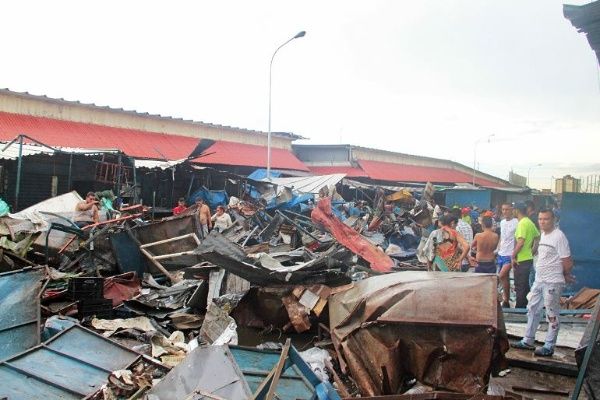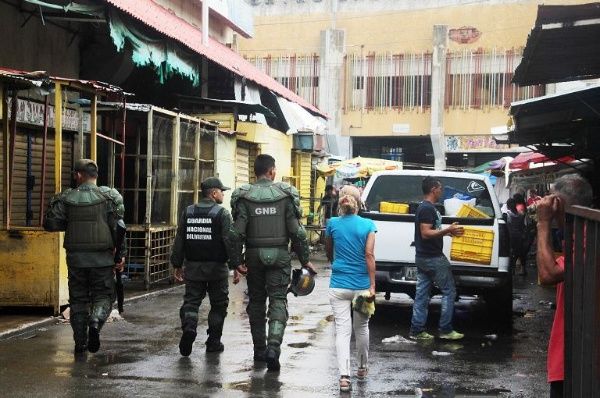Maracaibo Market Intervention Or How People Just Don’t Get It
Maracaibo mayor Omar Prieto raided Las Pulgas market in Maracaibo last week. What will this do for people? What will it solve? Nothing. The government apparatus works like a smooth machine in at least one way: people blame, hate and root against the wrong culprit all the time.


Photos: Miguel Romero retrieved
Omar Prieto gave them 48 hours. In his first speech after taking office as governor of Zulia, in December 2017, he said that shop owners at the Las Pulgas market had to stop reselling basic need products and cash or they’d face the consequences. The audience cheered euphorically. This was one of his most popular promises during the campaign.
But the 48 hours in Prieto’s promise became a little over nine months. Last Wednesday, September 26, Las Pulgas market was intervened in an operation led by Prieto himself, Maracaibo mayor Willy Casanova and National Guard officers. Their quest was to force shop owners to sell food on the cheap side and accept money from the old monetary cone. According to Prieto, “el pueblo asked for this.”
This commercial area, located in downtown Maracaibo for over 30 years, is known for its variety of products: you can find shoes, formal clothing, school supplies, and products such as rice, pasta, flour or oil. Additionally, until a few years ago, it had such good prices that it was considered a market for the poor.
Their quest was to force shop owners to sell food on the cheap side and accept money from the old monetary cone.
However, things changed as shortages and the cash crisis worsened. People could only find products at affordable prices if they paid in cash, because if they paid with credit or debit cards, costs rose up to ten times. This way, it went from being a market for poor people to a market for poor people with cash.
These measures started having a great impact on the local economy, due to the market’s enormous customer flow, to the point that people started parodying its name, calling it Central Bank of Las Pulgas. Many banknotes from the old cone were no longer received all over the city simply because they were no longer received in Las Pulgas. Its last victim was the Bs.F. 100,000 banknote, whose disappearance sparked protests.
By Thursday 27, after the intervention, things spiraled out of control and retailers reported that their stores had been destroyed by authorities who had also stolen their merchandise. But that was not the worst part: they claimed that they have been extorted every day by the very military officers who took part in the operation who, among other things, didn’t accept their Bs.F. 100,000 bills when collecting payment.
“We come here everyday to work for our money, but they force us to sell cheap food and they love it when we pay them. They force us to accept Bs.F. 100,000 banknotes and when we want to use those notes to pay them, they won’t take them either,” cried retailer María Botelho in a somewhat surreal interview for Radio Fe y Alegría.
The stories of military officers extorting citizens who work in this market aren’t new, but public complaints were scarce. This is why Botelho’s testimony had such an impact.
But her strongest phrase was: “I feel bad, ashamed of my people. If people came here to get cash, they could find it; if people wanted products to be sold with cards and cash at the same price, they got it. What are they complaining about now? Why are they so angry?” Botelho said, regarding citizens who were cheering the authorities and mocking the shop owners during the intervention.
The stories of military officers extorting citizens who work in this market aren’t new, but public complaints were scarce.
I’m usually depressed that most people around me don’t understand anything of what’s happening. They’re spotting enemies in all the wrong places.
They say they hate the government and shortages, but they demand that authorities keep producers’ prices in check.
They complain about the terrible mobile connectivity, but when a service provider increases their fee they lose their minds, and ask that authorities revert the prices, even though it’s the cheapest in the world.
They demand lower transport prices, but they complain that they have to wait for hours in a bus stop because there are less units due to the high cost of maintaining them.
They justify tortures against political prisoners because they’ve allegedly negotiated with the government; and every once in a while they repeat the phrase “we’re here because of our own actions” or “this isn’t Maduro’s fault, this is a war of the people against the people.”
How are we supposed to get out of this hole, then, if we keep digging?
Caracas Chronicles is 100% reader-supported.
We’ve been able to hang on for 22 years in one of the craziest media landscapes in the world. We’ve seen different media outlets in Venezuela (and abroad) closing shop, something we’re looking to avoid at all costs. Your collaboration goes a long way in helping us weather the storm.
Donate






